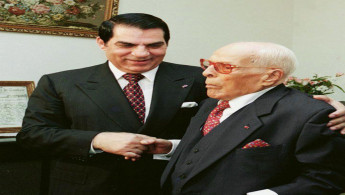Bourguiba: on road to redemption in Tunisia?
Fifteen years after his death, the late Tunisian leader Habib Bourguiba is still a controversial figure. That controversy has recently resurfaced when an adviser to the current president called for Bourguiba's statues to be returned to public squares around the country.
Beji Caid Essebsi's adviser, Mohsen Marzouk, said his proposal was a suggestion not a decision, and that the issue would be delegated to elected municipal councils.
His call provoked heated debate in Tunisia, with some quarters welcoming it, others rejecting it and still others mocking it. Bourguiba's statues occupied public squares in most of the country's cities until the now deposed president Zine el-Abidine Ben Ali ordered their removal.
| Those who have once again embraced Bourguibism compete over their "worthiness to carry on with his project." |
Those who have once again embraced "Bourguibism" today and claim to belong to Bourguiba's school of thought and even compete over their "worthiness to carry on with his project" remained silent when his statues were removed. This was not limited to the Constitutional Democratic Assembly (CDA), the Constitutionalists or the Bourguibists.
It has spread to other intellectual and political schools that used to oppose and criticise Bourguiba, and whose adherents were jailed and forced to flee into exile because of him. The only exception is the Arab nationalist group, which never reconciled with him and never forgave him his declared hatred for his stand against Arab unity.
Bourguiba believed in the "Tunisian nation", and the need for it to look north toward modern Europe and follow its example. Bourguiba's political compass always pointed in that direction, never changing in the least.
He resisted all attempts by the late Libyan leader Muammar Gaddafi to unify Tunisia and Libya, for which Tunisia paid a heavy price, including an attempted coup and military intervention.
Bourguiba based his principled rejection of unity on the failure of the United Arab Republic that briefly united Syria and Egypt between 1958 and 1961.
However, he was also affected by his well-known dispute with late Egyptian leader Nasser and his stance on Palestine, which prompted proponents of resistance to accuse Bourguiba of treason and submission.
Rehabilitation
However, the current rehabilitation of Bourguiba's reputation is regarded by many as political opportunism, an attempt to exploit the love of many Tunisians for Bourguiba for political and electoral gain.
This accusation is being directed at all parties that came into existence when the CDA was dissolved, such as Nidaa Tounes. Those who made that accusation point out that after Bourguiba was deposed, no one announced they subscribed to Bourguibism until the 2011 revolution that toppled Ben Ali.
Predictably the CDA played on the memory of Bourguiba after the revolution, exploiting his public popularity to rebuild their political power, exploiting Bourguiba's slogan of "reverence and dignity of the state".
Essebsi went to great lengths to emulate Bourguiba in the city of Qasr Hilal - the birthplace of the CDA - and the resemblance between them in form and substance is striking in many respects, even though the two men disagreed strongly over many issues.
Many political groups and politicians are now wrangling over the issue of Bourguiba's legacy in Tunisia.
Some espouse the idea of the modern, open state of which Bourguiba dreamed. Others believe he sought to build a state on the bodies of his opponents, and that more than one generation paid the price for his folly.
How far Bourguiba can influence modern Tunisia from beyond the grave remains to be seen.
This is an edited translation from our Arabic edition.



